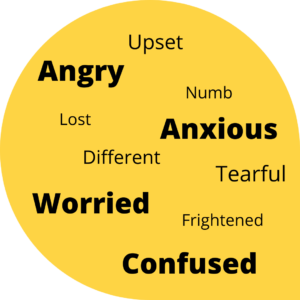Getting your head around your condition
Chances are there’s enough to be dealing with in your life right now, without a diagnosis of a life-long genetic condition being added in. You might also be dealing with the health problems of a parent or other family member.
Whether you are newly diagnosed, been diagnosed for a while but just ‘getting your head around it, AMEND is here to help you feel less on your own with it all.
Scroll on down for some tips and Megan & Molly’s film about their diagnosis…
Newly Diagnosed?
There is no one way to feel about this, but you might feel at different times:

A diagnosis of a genetic condition can be a lot to process, and probably not something that any of your friends will have gone though. Going through any of the above feelings at different times is very normal, and all part of the process of coming to terms with having this condition.
If it’s ‘getting to you’, or you’re not feeling your usual self, do talk to someone. This could be a parent or other family member, a teacher/family friend, a school or university counsellor, or Kym or David from AMEND’s Counselling Service.
If you’d like to speak to another young person in AMEND, we also run two WhatsApp groups for 13-17 (parental permission needed) and 18-30 year olds respectively. Visit our webpage for more information on how to join.
Remember: After being diagnosed, your regular hospital tests and appointments are necessary to help keep you as well as possible
“I was pretty freaked out when I got diagnosed in Year 10. None of my friends had heard of it, and I didn’t know what to say. It was a lot to take on board, and so many appointments for this or that at the start. I felt a bit ‘on my own’ for a while. I don’t think about it as much now, just when my sister or I go for appointments really. I know I might have to have an operation when I’m older, but for now I’m just getting on with things”
Molly, aged 17 [Not her real name]
“I was diagnosed at the age of 2. I think it was just lucky that it was caught so early on and I
don’t really remember anything about being diagnosed or anything like that really.”Cameron, aged 21
Diagnosed for a While?
It may be that you’ve known that you have your condition since you were very young, but are only now beginning to think about what it means for you. Maybe there has been a change in your health, or a family member’s; maybe you are about to transition to adult services , started a relationship, or are about to go to university.
You might be visiting, or re-visiting some of the feelings above, when someone is newly diagnosed. This is very normal.
Do You Have a Family Member with the Condition?
-

-
Having a family member with the condition can often be supportive and reassuring, but it can also be challenging at times. It’s important to remember:
- Everyone’s experience of a condition is different. If a family member has had a very difficult time (or died as a result) it is particularly important to remember that it’s likely you have been diagnosed at a much younger age than they were. The monitoring you are being offered now (e.g. regular scans and blood tests) aims to pick up any problems earlier, in order to treat them more quickly and effectively as a result.
Tips for Living Life with your Condition
- Aim for your condition being part of your life, not taking over your life you will work out over time how best to ‘live with’ your condition and what it means, for you.
- Be cautious with information from the internet about your condition. It will not always be up-to-date, accurate or relevant to your individual health situation. Particularly If you read anything that bothers you, do talk to a friend/family member, someone at AMEND, or your hospital doctor/nurse.
- Work with your hospital team to help them help you. Always be honest about how you are. It’s fine for a private chat with your doctor/nurse away from other people in your appointment and if you’d feel more comfortable being allocated a different regular doctor entirely to your family member/s, it’s okay to ask about this too. There is more advice about making the most of appointments in Moving to Adult Services.
Telling Other People
-
Everyone has different feelings about this, but it can really help to have a couple of good friends who are aware you have this condition, and that you can talk to. There is more advice and tips in our ‘Sex and Relationships sections’ here.
Telling your school, university or employer can also be helpful, and there is more about this here, or here for employment. They can then support you if you need to take time off for appointments or treatment, and be aware if you are a not performing or concentrating as well as usual.
-

Remember: You are not on your own with your condition, AMEND is always here to support you.
-
Diagnosis: Megan & Molly